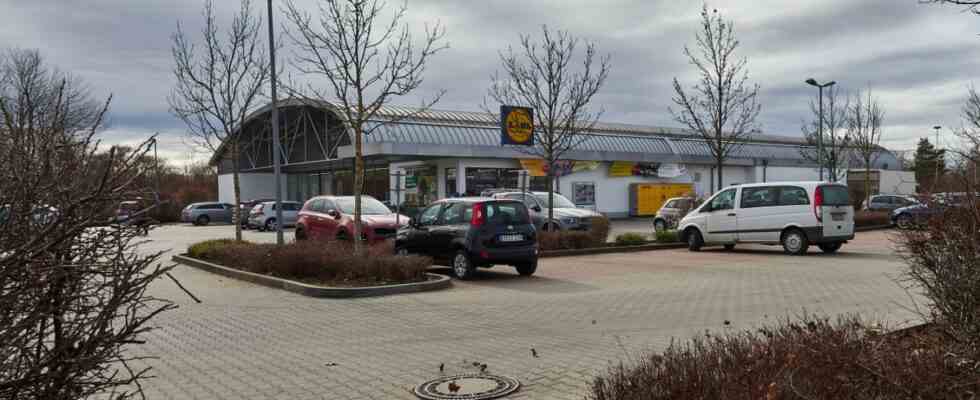In 2008, Poing had a good 13,500 inhabitants. 15 years later, i.e. now, almost 17,000 have been cracked – a growth of almost 26 percent. However, what has not grown over the years is the Lidl supermarket on Gruber Strasse: in 2008, when the supermarket opened, the building was completely sufficient for customers and staff. But with the growth of the community, there have been more and more customers, in order to cope with the greater rush, more staff work there today than before. In short: More and more people are squeezing through the narrow aisles of the store while the employees do the same in their staff rooms. But not for long: A new building for the branch should not only be adapted to current needs in terms of space, but also follow a sustainable construction concept – a Bavaria-wide pilot project by Lidl.
At the most recent meeting of the municipal council on Thursday evening, the municipality invited two Lidl representatives to present the current plans for the project – Fabian Schrom, real estate portfolio manager for the west area, and Markus Schneider, project manager for construction. The fact that the branch in its current state is no longer acceptable to either customers or staff and that something needs to be done was without a doubt: Two trolleys in one aisle – that’s a problem, as Fabian Schrom said. However, it was not immediately clear whether this was to be part of a renovation or a new building. “We thought about it for a long time and checked whether a conversion was possible,” says Schrom. With regard to the environment, a conversion and appropriate retrofitting would be the better option – but only at first glance.
A new building is more ecological than a conversion
“If we want to reposition ourselves ecologically, then we have to demolish and rebuild,” said Schrom. There are several reasons for this, as he explained: On the one hand, it is not possible to equip the current roof with a PV system, but that is what the company and the community want. On the other hand, no insulation can be installed in the existing building, and the old oil heating is no longer up to date.
During the demolition and new construction work, operations are to be outsourced to a tent branch on the opposite property. This phase will probably last around six months, as Schrom said when asked by Werner Danksreiter (Greens). Schrom was unable to answer Michael Lanzl’s (CSU) question as to whether there would be a DHL Packstation as part of the interim solution, as there is in the current market. He wants to encourage DHL to do this – the new building will definitely house a packing station.
The roofed peripheral parking spaces are also to be equipped with photovoltaics
The entire roof of the new branch will also be equipped with a PV system and the flat roof will be greened. At the suggestion and request of several municipal councils, the parking spaces at the edge of the parking area should also be covered and equipped with photovoltaics. The building itself will be made of wood – a renewable and therefore sustainable raw material that also stores CO₂. The Poinger Lidl branch will be the first in Bavaria to be built in this way. From the outside, however, you will not be able to see any of the wood due to the facade cladding.
The new building will take up more space, instead of the previous 1000 square meters of retail space, 1415 square meters will be possible. As a result, the shelves in the branch itself are flatter and more spacious, and the aisles are wider. And the staff will also have more space in the future. The variant in which the new building is placed across Gruber Strasse and thus on the existing concrete slab was preferred by all those involved.
The parking lots are getting wider and the bike racks more
There will be further changes in the parking area. The individual parking spaces are to grow in width, from now 2.30 meters to 2.70 meters. The number of parking spaces will also shrink accordingly. There will also be eight extra wide parking spaces of three meters and 32 bicycle racks, which will also have enough space for five cargo bikes. Green areas with trees are to be created between the parking spaces for cars.
The calculations are currently based on three electric charging stations. In addition, empty pipes are to be installed so that 20 percent of the parking spaces for electric cars can be retrofitted at a later date. Marc Salih (FDP) suggested equipping all parking spaces with empty pipes. “In 15, 20 years you might be happy if you don’t have to rip everything open because it will be needed,” he said. 100 percent is not possible, replied Fabian Schrom. But he wants to check whether equipment is possible with which 30 or 40 percent of the parking spaces could be adapted to e-cars.
At the end of the meeting, the municipal councils unanimously decided that the plans presented should serve as a basis for changing the development plan. The concrete vote on those changes is planned for one of the following meetings.

